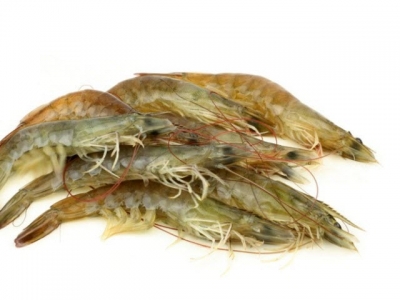Shrimp trial sets stage for insect protein in aquafeed

French insect protein player Ynsect is warming up the aquaculture feed market in advance of next July, with the release of research results that substantiate the growth performance of its TMP insect meal in shrimp.
The trial, conducted by Kasetsart University in Bangkok, confirmed the performance of Ynsect’s TMP (Tenebrio molitor defatted protein meal) in terms of its impact on weight gain, palatability and FCR (feed conversion ratio) in juvenile white leg shrimp.
The best results were observed when TMP was included at a level of 10.3% in the diet (50% fishmeal replacement), with shrimp showing an increase of 33.7% in weight gain and 24% in final body weight and FCR decreasing by up to 25% versus those subjects fed a control diet.
The researchers tested five different diets, one a control containing 25% fishmeal, and the other four containing different levels of TMP (25%, 50%, 75% and 100%) as a replacement for fishmeal.
No significant difference was assessed in the palatability of the diets, but diets containing TMP resulted in greater weight gain and body weight by the end of the eight-week trial period.
Besides monitoring feed performance criteria, the study included a challenge test performed with the pathogen Vibrio parahemolyticus, which is responsible for Early Mortality Syndrome.
1/ Immunity boosting benefit
This test indicated that TMP has immunity-boosting properties, as after 10 days, the survival rate had reached 90% in those shrimp in the 50% TMP replacement group, versus 56.7% in the control group.
Asked about the mechanism responsible for this effect, Antoine Hubert, CEO and co-founder of Ynsect, told FeedNavigator: “It seems quite certain that TMP boosts the immune system but we do not know yet precisely how it works, biologically speaking. This patented dietary immuno-stimulant property could come from the chitin binded to specific proteins or from specific peptides that strengthen the health of the crustaceans.”
The findings have not yet been published in a peer-reviewed journal, but Hubert said that his company planned to present them at various conferences this year.
The white leg shrimp is one of the main species in aquaculture. 3.7 million metric tons are produced every year (source: Food and Agriculture Organization of the United Nations), mainly in China, Thailand, Vietnam and Indonesia. This was Ynsect’s first trial involving white leg shrimp, and Hubert said that as digestibility was high and the main blood parameters had been tested, the company didn’t see a need for further trials on this species any time soon.
He added that any feed company interested in incorporating TMP into aquafeed once the block on the use of insect protein is lifted next summer may want to run their own trials.
“The EU green light for insect proteins in aquafeed is clearly opening the gate for sales in aquafeed - including shrimp feed - historically it was forbidden to sell insect protein in Europe and to export it out of Europe,” he said.
The shrimp trial will be followed by new trials on Atlantic salmon, European seabass and red seabream, and the inclusion of mealworm oil TMO will be tested in the grow-out phase of rainbow trout.
2/ Building evidence beyond aquaculture
Besides studies in aquaculture species, Ynsect is building a base of research supporting the use of TMP in pigs and poultry, although at present, there are no plans in Europe to open up these markets for insect protein.
“We will be discussing these topics among others during our next IPIFF (International Platform of Insects for Food and Feed) General Assembly in March, which will deal with the new priorities of our association,” said Hubert. “The road to the evolution of a new EU regulation might be long, and the EU Commission and EFSA (European Food Safety Authority) will most likely need accurate scientific data to be able to move forward. We are keen to investigate the performance of TMP in piglet feed in order to provide such data. The pig feed market is also of interest in Asia where several national regulations already authorize insect proteins in feed.”
TMP is currently produced at a pilot center in Jura, France, but next year work is scheduled to start on a large-scale factory that will have the capacity to produce 20,000 metric tons per year.
“This will provide an affordable source of insect protein to the aquafeed and pet food markets on a significant scale for the first time in insect industry history,” said Hubert.
Related news
Tools

Phối trộn thức ăn chăn nuôi

Pha dung dịch thủy canh

Định mức cho tôm ăn

Phối trộn phân bón NPK

Xác định tỷ lệ tôm sống

Chuyển đổi đơn vị phân bón

Xác định công suất sục khí

Chuyển đổi đơn vị tôm

Tính diện tích nhà kính

Tính thể tích ao



 Mixed feeding schedules benefit growth of Pacific shrimp
Mixed feeding schedules benefit growth of Pacific shrimp  Organic acids in aquafeeds: A potential substitute for…
Organic acids in aquafeeds: A potential substitute for…